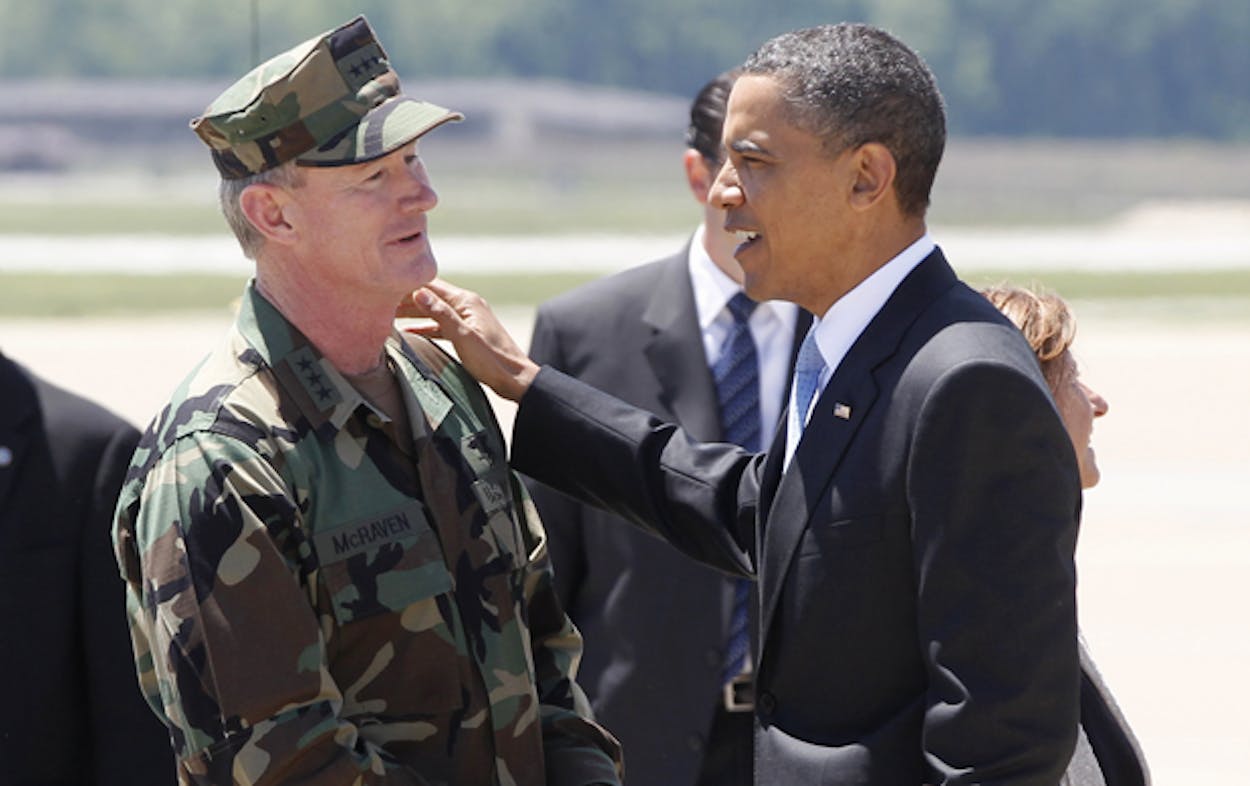After Vice Admiral Bill McRaven led SEAL Team Six in a raid that resulted in the death of America’s public enemy number one (and made the world a safer place), it’s probably fair to say nothing would make 2011 a better year for the hero. But being named the Dallas Morning News’ Texan of the Year should certainly be another feather in his cap.
McRaven, now a four-star admiral, tends to give the press a wide berth, but he sat down for an hour-long interview with Dallas Morning News‘ editorial board member Tod Robberson, who traveled to downtown Houston to meet the San Antonio-native in an undisclosed location (natch) in November. The paper ran a 2,700-word editorial on the Navy SEAL and posted text of the full interview online (both are behind the paper’s paywall).
On the details of the bin Laden raid, McRaven kept mum, an “easygoing but unmovable wall of silence.” McRaven wouldn’t utter even a word on his own reaction to bin Laden’s death: “McRaven was so tight-lipped about the operation, he wouldn’t even discuss the emotions he felt — happy, melancholy, relieved, or whatever — as he monitored it from Jalalabad,” the Morning News editorial said. Here’s what he would say:
I’ve made a pact that I’m not going to talk about any details of the operation. I tell folks that I’m prepared to say a few things: One, that the CIA was absolutely magnificent. I think it will go down in history as one of the great intelligence coups of all time. And the work that the CIA did to find bin Laden, when the real story comes out, people will be absolutely spellbound, amazed and proud of what their intelligence community did.
McRaven was unsparing in his praise of the president, dubbing him “exceedingly presidential” and thorough. President Barack Obama and his national security team “looked at all potential options, and they walked through the nightmare scenarios,” McRaven said. As he told the Morning News, this operation, as with all special ops, followed a carefully crafted strategy: “We can’t afford to be cavalier. We can’t afford to be cowboys . . . you have to plan meticulously . . . if you don’t do the small things well, you won’t do the big things well.”
In the editorial, McRaven emerges as a smart, and dedicated man who also happens to be astoundingly humble. “So the secret is out: The commander of the world’s most lethal fighting force turns out to be a nice guy. We just don’t recommend that you cross him,” the editorial concludes.
While we don’t yet have McRaven’s official account of the raid, Nicholas Schmidle presented the most detailed recounting of the raid to date in an August piece in the New Yorker. The article was based on a series of interviews with mainly unnamed officials and faced criticism for reading like a first-hand account of the raid when Schmidle didn’t interview any actual Navy SEALs who were in Abbottabad.)
McRaven’s fingerprints were all over the raid, according to Schmidle. McRaven personally laid out the idea of a helicopter raid to the president on March 29, and was given the green light to start rehearsing it. “Special operations is about doing what’s not expected, and probably the least expected thing here was that a helicopter would come in, drop guys on the roof, and land in the yard,” an unnamed special-operations officer told Schmidle.
On the night of the raid, McRaven was in Jalalabad, Afghanistan, some 160 miles from Abbottbad. Connected by video link to CIA headquarters and the Situation Room, McRaven narrated the raid to the president as the action unfolded. “He was almost like the voice of Walter Cronkite, completely calm,” Michael Leiter, director of the National Counterterrorism Center, told Time‘s Barton Gellman for his story about McRaven, who was named as one of the magazine’s Person of the Year runners-up.
When the helicopter carrying bin Laden’s body landed on the tarmac in Jalalabad, McRaven was there to unzip the bodybag and look at the corpse’s face to confirm his identity. Four days later, McRaven briefed the president on the raid at Fort Campbell, Kentucky, using a three-dimensional model of the compound as a handy visual aid.
Back in June, the Alcalde scored a coveted interview with the UT journalism alum, who spoke highly of his alma mater. “The University taught me the great values of standing on my own, dealing with the pressures of being a student, prioritizing commitments, and dealing with the complicated and diverse situations that are part of growing up and maturing,” McRaven said.
In the days after the May 2 raid, Sig Christenson profiled the then-vice-admiral for McRaven’s hometown paper, the San Antonio Express-News. A ’73 grad of Roosevelt High School, McRaven ran track, was a member of the chess and ecology clubs as well as the Fellowship of Christian Atheletes, and studied drama.







